Different Millets for Weight Loss And Diabetes: Recently, many people have become more health conscious. As technology is increasing, our health is also getting damaged. Eating junk food is also reducing our life expectancy. Nothing is more important than health. We have many health benefits by including them in our diet. We must know about them in order to prevent our health from suffering in the future. let’s learn about them in this article.
Millets requires very less water to grow. making it an accessible food grain for all.
Table of Contents
What is mean by Millet Seed?

Millet seeds are too small to see. But they are very very good for health. There are many types of these. During the day we eat white rice. By taking millets instead of white rice we can improve our overall health.
Nutritional values of millet Seeds: Carbs per 100g
Here is a table summarizing the general nutritional values of millets per 100 grams of uncooked grain.
| Nutrient | Amount (per 100g) |
|---|---|
| Calories | 350-380 kcal |
| Carbohydrates | 65-75 g |
| Protein | 7-13 g |
| Fat | 1.5-7 g |
| Dietary Fiber | 3.5-10 g |
| Iron | 2-5 mg |
| Magnesium | 120-250 mg |
| Calcium | 8-350 mg |
| Phosphorus | 230-300 mg |
| Potassium | 150-350 mg |
| Zinc | 1-3 mg |
| Folic Acid | 30-50 mcg |
| Vitamins (B-group) | Small amounts (e.g, B1, B2, B3, B6, folate) |
Top 10 Uses of Millets:
- Fiber: Millets useful for digestion. That will helps for regular bowel movements.
- Weight Loss: Low calories and high in fiber great for weight loss.
- Heart Health: Help to reduce cholesterol. So risk of cardiovascular diseases will reduce.
- Blood Sugar: It has low glycemic index. So it is best for diabetes.
- Energy Boosting: Carbohydrates will provide sufficient energy to our body.
- Antioxidants: Improves immune system. Decreases Stress levels.
- Bones Health: Strengthens bones. prevents osteoporosis.
- Gluten-Free: A great alternative gluten sensitivities.
- Digestion: Millets are easy on the stomach and help prevent digestive issues like constipation.
- Skin Health: The nutrients in millets useful for skin health.
Millets for Weight Loss:
- Low in Calories: Millets are very low in calories. Therefore they are a good choice for weight loss.
- Fiber: The fiber in Millets reduces our appetite. When we eat them, they are digested slowly. So we don’t feel hungry for longer. So we eat less.
- Regulates Metabolism: Millets boost our metabolism. So body burns more fat.
- Improves Digestion: High fiber improves the digestion system.
Millets for Diabetes:
- Glycemic Index: Millets have less glycemic index. That means sugar levels slowly increases in our blood.
- Magnesium: Magnesium in millets supports better blood sugar control. It is very useful for diabetic patients.
- High Fiber: reduces absorption of glucose. So regulates blood sugar levels.
List Of Top 12 Types of Millets in India
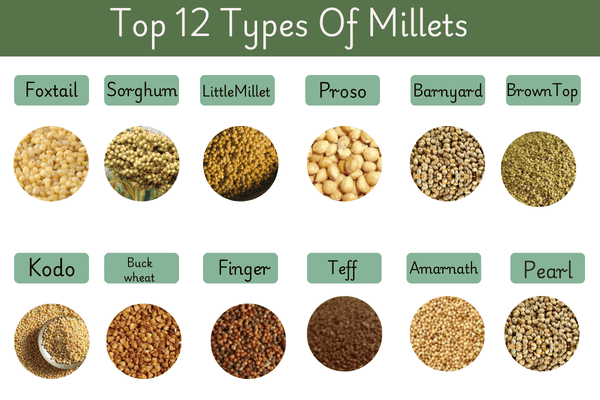
| Millet Type | Other Names |
|---|---|
| Foxtail Millet | Kakum, Kangni |
| Proso Millet | Chena |
| Sorghum Millet | Jowar |
| Finger Millet | Ragi |
| Kodo Millet | Kodra, Kodon |
| Little Millet | Samai / Kutki |
| Pearl Millet | Bajra |
| Brown Top Millet | Korale, Urdan |
| Barnyard Millet | Sanwa, Oodalu |
| Buckwheat Millet | Kuttu |
| Teff Millet | – |
| Amaranth Millet | Rajgira |
What are the Different Millet seeds for Weight Loss And Diabetes
Foxtail Millet
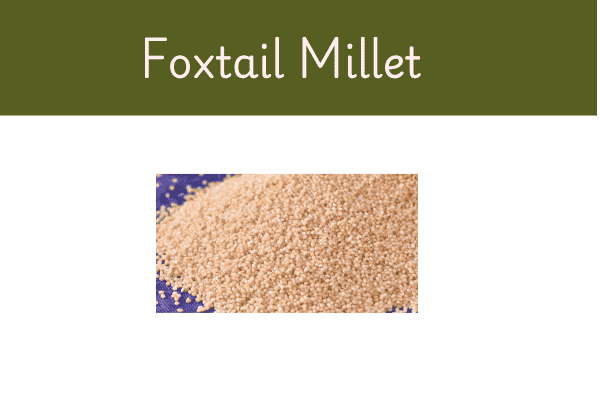
Foxtail Millets are very high in fiber, carbohydrates which helps to control Blood pressure and Diabetes. The fiber present in them prevents constipation problem. Also helps in proper digestion of the food eaten. So indigestion is reduced. Due to the fiber present in these, the food we eat digests very slowly. Therefore, hunger does not subside quickly, so we eat less. Because of that our white is also under control.
Nutritional Value per 100g:
- Calories: ~351 kcal
- Protein: 12g
- Fat: 4.3g
- Carbohydrates: 60g
- Fiber: 8.5g
- Vitamins: Rich in B-vitamins, especially niacin (B3) and B6.
- Minerals: High in iron, magnesium, and phosphorus.
Health Benefits:
- Foxtail millet is useful for sugar control,
- BP reduction, heart health, weight loss, indigestion problem,
- constipation relief.
Proso Millet
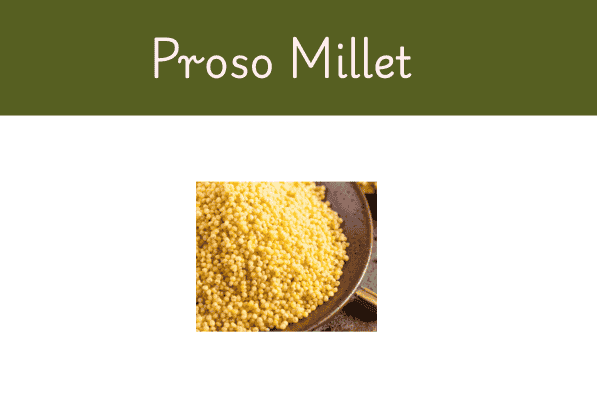
- Proso Millet that ripens quickly with very little water.
- It has been believed to be one of the most foods. It is gluten free.
- It contains many nutrients like carbohydrates, proteins and some fats. It also contains minerals like manganese, iron, zinc and magnesium.
Nutritional Value per 100g:
- Calories: ~378 kcal
- Protein: 11g
- Fat: 4.2g
- Carbohydrates: 73g
- Fiber: 8.5g
- Vitamins: Good source of B-vitamins, particularly B1 (thiamine) and B3 (niacin).
- Minerals: Rich in iron, magnesium, and phosphorus.
Health Benefits:
- Proso millet is very good for our nervous system.
- It helps to reduce the cholesterol in our blood.
- It helps to reduce the cholesterol, diabetes and acts as an anti-aging agent.
To know more about Proso millet in Telugu Read the article” Proso millet in Telugu“.
Sorghum Millet
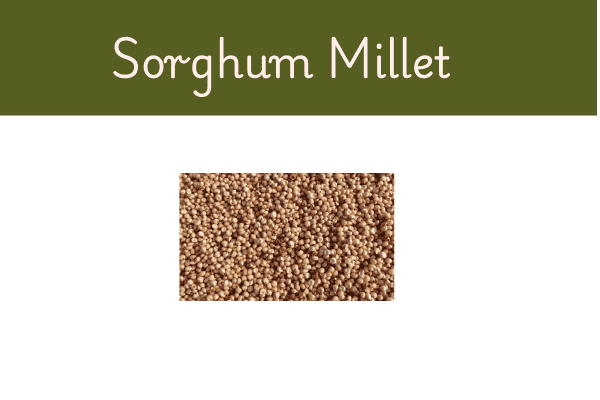
Nutritional Value per 100g:
- Calories: ~329 kcal
- Protein: 11g
- Fat: 3.3g
- Carbohydrates: 73g
- Fiber: 6.3g
- Vitamins: High in B-vitamins, especially niacin (B3) and B6.
- Minerals: Rich in iron, magnesium, potassium, and phosphorus.
Health Benefits:
- They produces red blood cells.
- They protect the health of our digestive system.
- Anti-oxidants present in them fight with inflammation and boost immunity.
Finger Millet
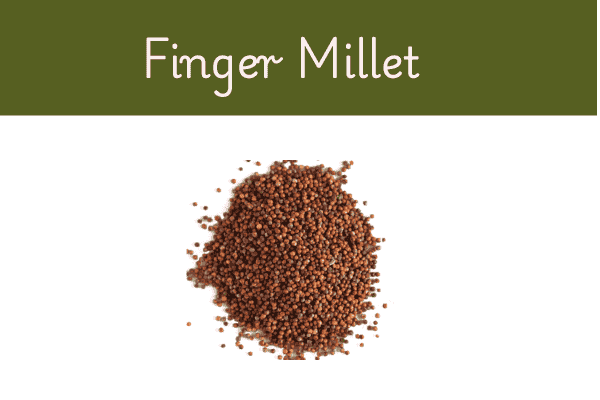
Nutritional Value per 100g:
- Calories: ~378 kcal
- Protein: 7.6g
- Fat: 1.3g
- Carbohydrates: 72g
- Fiber: 3.6g
- Vitamins: Rich in B-vitamins, especially niacin (B3) and B6.
- Minerals: High in calcium, iron, magnesium, and phosphorus.
Health Benefits
- Helps strengthen bones due to its high calcium content.
- Helps regulate blood sugar levels, making it great for diabetics.
- Helps improve digestion with its rich fiber content.
Kodo Millets Health Benefits:
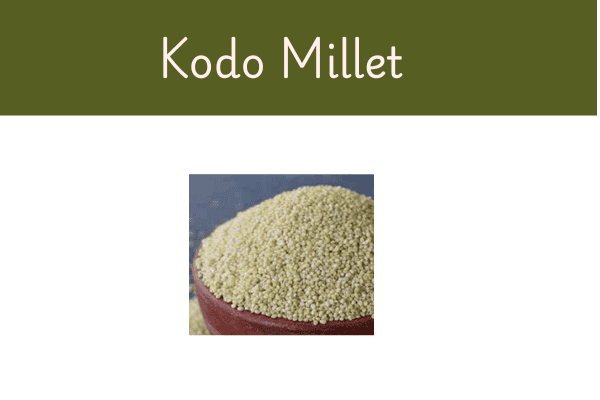
Nutritional Value per 100g:
- Calories: ~350 kcal
- Protein: 8.3g
- Fat: 4.2g
- Carbohydrates: 65g
- Fiber: 5.2g
- Vitamins: Good source of B-vitamins, especially niacin (B3) and folate.
- Minerals: Rich in iron, magnesium, and phosphorus.
Health Benefits
- Helps with weight management due to its high fiber and protein.
- Helps regulate blood sugar and improve heart health.
- Helps support digestion and prevent constipation.
Little Millet
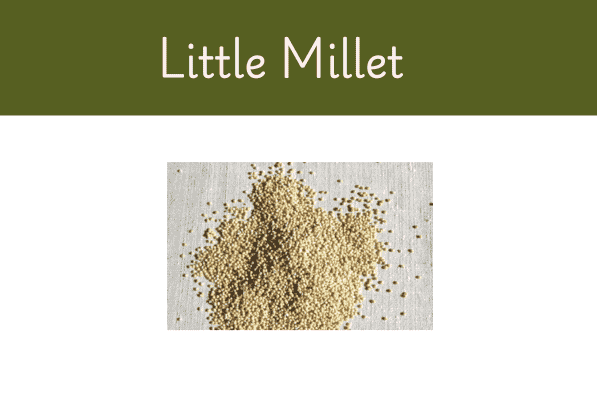
Little Millet Nutritional Value per 100g:
- Calories: ~378 kcal
- Protein: 7.7g
- Fat: 4.2g
- Carbohydrates: 72g
- Fiber: 7.6g
- Vitamins: Contains B-vitamins, particularly niacin (B3) and B6.
- Minerals: Rich in iron, magnesium, phosphorus, and calcium.
Health Benefits
- Helps improve digestion with its high fiber content.
- Helps in weight management and boosts metabolism.
- Helps maintain bone health with its rich mineral content, including magnesium.
Pearl Millet
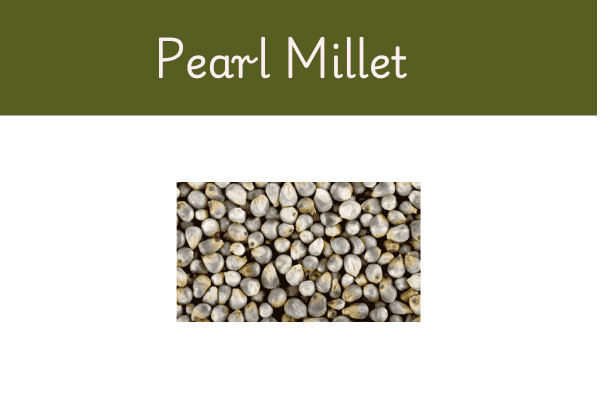
We know all about Pear Millet. It is very good for health.
Nutritional Value per 100g:
- Calories: ~378 kcal
- Protein: 11g
- Fat: 4.2g
- Carbohydrates: 73g
- Fiber: 8.5g
- Vitamins: Good source of B-vitamins, particularly niacin (B3) and B6.
- Minerals: High in iron, magnesium, phosphorus, and potassium.
Health Benefits
- Helps regulate cholesterol and improve heart health.
- Helps in weight management with its high fiber and protein content.
- Helps support digestive health and prevent constipation.
Brown Top Millet
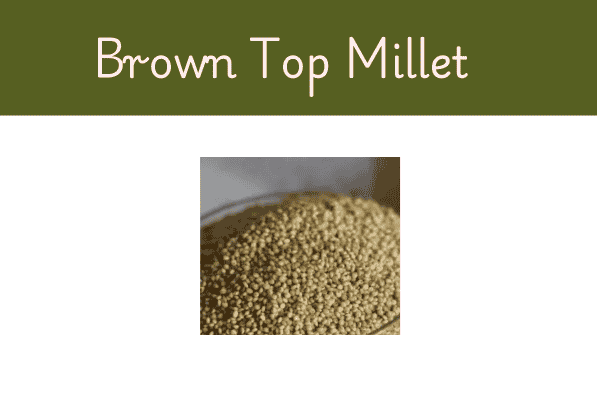
Nutritional Value per 100g:
- Calories: ~378 kcal
- Protein: 9g
- Fat: 4.5g
- Carbohydrates: 72g
- Fiber: 8g
- Vitamins: Contains B-vitamins, especially niacin (B3) and B6.
- Minerals: High in iron, magnesium, and phosphorus.
Health Benefits
- They gives energy to our body.
- Improves our gut health.
- By decreasing bad cholesterols supports heart health.
Barnyard Millet
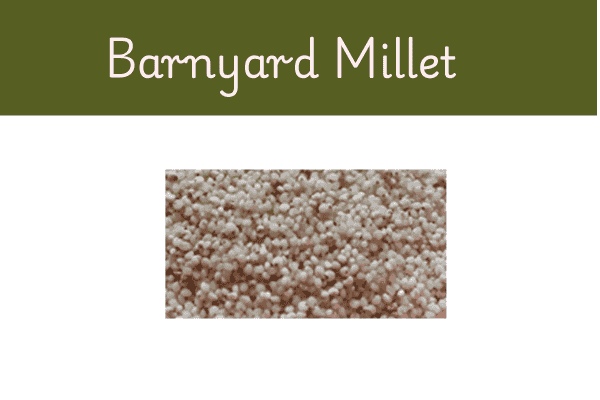
Nutritional Value per 100g:
- Calories: ~300 kcal
- Protein: 11g
- Fat: 3.6g
- Carbohydrates: 60g
- Fiber: 9g
- Vitamins: Good source of B-vitamins, especially niacin (B3) and folate.
- Minerals: High in iron, magnesium, and phosphorus.
Health Benefits
- Reduces diabetes.
- Reduces Constipation problem.
- Improves our body immunity.
Buckwheat millet
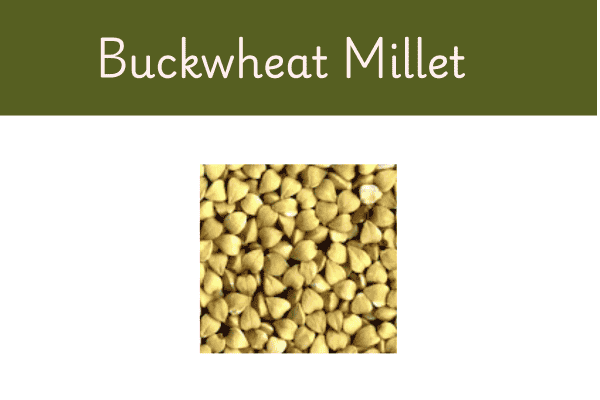
Nutritional Value per 100g:
- Calories: ~343 kcal
- Protein: 13.3g
- Fat: 3.4g
- Carbohydrates: 71.5g
- Fiber: 10g
- Vitamins: Rich in B-vitamins, especially niacin (B3) and B6.
- Minerals: High in magnesium, manganese, iron, and phosphorus.
Health Benefits
- Buckwheat Improves heart health by reducing cholesterol levels.
- Regulates blood sugar. So helps to Diabetic Patient.
- Hight protein repairs muscle damage.
Teff millet
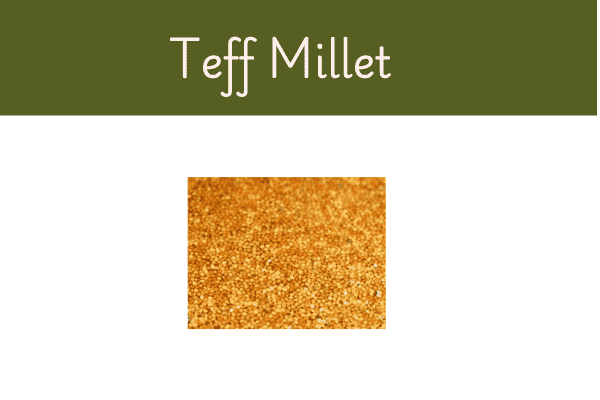
Nutritional Value per 100g:
- Calories: ~367 kcal
- Protein: 13.3g
- Fat: 2.4g
- Carbohydrates: 73g
- Fiber: 8g
- Vitamins: Good source of B-vitamins, especially niacin (B3) and B6.
- Minerals: Rich in iron, calcium, magnesium, and phosphorus.
Health Benefits
- Strengthen bones. Since they have high calcium content.
- Reduce digestion problems.
- reduces bad cholesterol and weight of our body.
Amaranth Millet
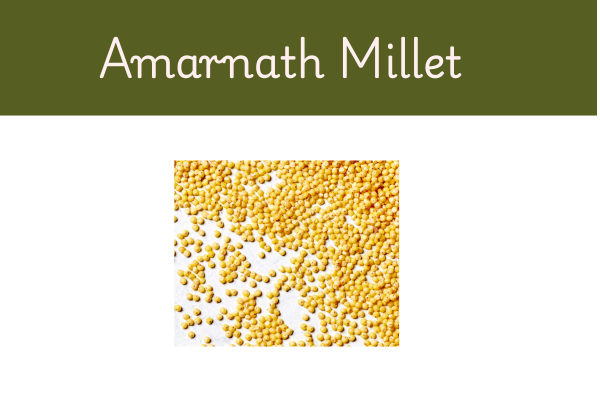
Nutritional Value per 100g:
- Calories: ~371 kcal
- Protein: 13.6g
- Fat: 7g
- Carbohydrates: 66g
- Fiber: 6.7g
- Vitamins: Rich in B-vitamins, especially folate (B9) and B6.
- Minerals: High in iron, magnesium, phosphorus, and calcium.
Health Benefits
- Repairs muscles and boost their growth .
- Improves digestion.
- Controls blood sugar and cholesterol levels.
For more Information About Types of Millets in Telugu please visit this post.
Frequently Asked Questions
What are the Best top 5 millets?
Answer: The Best top 5 millets are Finger Millet (Ragi), Foxtail Millet (Kangni), Sorghum (Jowar), Kodo Millet and Pearl Millet (Bajra),
Which millet is best for weight loss?
Answer: Foxtail millet is the best for weight loss due to high fiber content present in it. It keeps our stomach full for long time. It supports for fat burning. Pearl millet (Bajra) is also a good option for weight management.
Is quinoa a millet?
Answer: No, quinoa is not a millet. Both millet and quinoa are gluten-free and used as grain alternatives. quinoa belongs to the Chenopodiaceae family. Millets are part of the Poaceae family(grasses like wheat and rice).
To know more information read “quinoa in Telugu”.
What millet recipes can we cook with millets?
A: The best millet recipes are khichdi, dosa, idli, upma, pulao, porridge, roti, and salads with millets.
What is the best time to plant millet seeds?
The best time to plant millet seeds depends on the climate. Usually, plant them in late spring or early summer. The soil should be 18-24°C (65-75°F). Millet grows well in warm weather with enough moisture.
